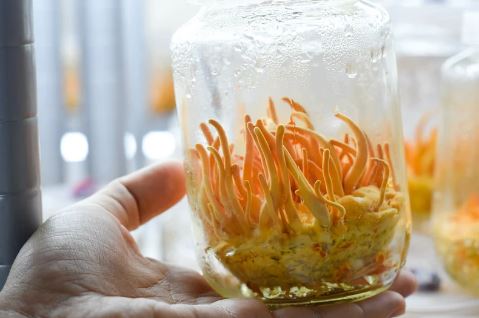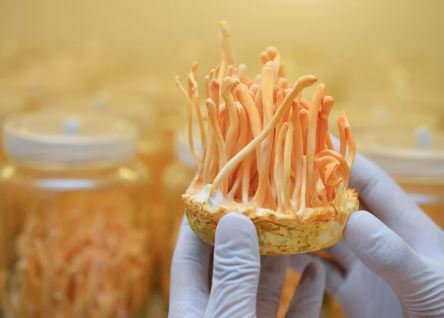Cordyceps


Cordyceps mushrooms encompass more than 400 different species and can be found across the globe – from China and Japan to India, the US, Australia, and South America. In traditional Chinese medicine, Cordyceps species have a rich history of use for strengthening the lungs, nourishing the kidneys, enhancing sexual health, and boosting overall well-being. These parasitic fungi are famed for their unique habit of infecting specific insects and arthropods, with each Cordyceps species exhibiting a remarkable affinity for a particular host.
There are two primary varieties, Cordyceps sinensis and Cordyceps militaris, that stand out as the most renowned for their medicinal properties. Historically, the coveted cordyceps sinensis was exclusively found on high-altitude “mummified” caterpillars in the Tibetan mountains. This made it exceptionally rare and outrageously expensive, often fetching prices as high as $22,000 per kilogram. In contrast, Cordyceps militaris emerges as a commercially viable alternative for those seeking the benefits of Cordyceps mushrooms. This Cordyceps species can be cultivated at scale to produce mushroom extracts, making it more accessible to the general population.
Within the Daoist herbal tradition, Cordyceps holds a reputation for enhancing physical performance, accelerating post-exertion recovery, and nurturing an overall sense of vitality in the body and mind. The primary bioactive compounds in both medicinal varieties are beta-glucans and adenosine, with Cordyceps militaris also boasting an exceptional component known as cordycepin. Remarkably, the militaris species contain up to 90 times more of this distinctive compound than its sinensis counterpart (1).
Boosts Immune System Function
Healthy Inflammatory Response Anti-Aging
While a certain degree of inflammation is beneficial, excessive inflammation can contribute to a wide range of diseases and accelerated aging. It has been shown that Cordyceps’ beta-glucan and cordycepin play a pivotal role in facilitating a balanced and healthy inflammatory response (3-9). Notably, research has unveiled Cordyceps’ ability to suppress specific proteins that trigger inflammation (10), solidifying its status as a valuable anti-inflammatory supplement. Additionally, animal studies have suggested that Cordyceps mushrooms may impact adenosine receptors, offering further insight into their inflammation-balancing properties (11).
Cordyceps also holds significant potential in reducing age-related inflammation at both cellular and mitochondrial levels. Its robust antioxidant properties enable it to neutralize free radicals that inflict damage on DNA, mitochondria, and various healthy tissues upon contact, a capability that highlights its anti-aging effects (12).
Athletic Performance | Respiratory Health & Capacity
One of the most notable health benefits of Cordyceps is its potential to enhance physical performance, endurance, and respiratory health. Cordycepin, in conjunction with adenosine, enhances your body’s utilization of oxygen – especially during physical exertion. Research suggests that Cordyceps may increase the body’s production of adenosine triphosphate (ATP), the primary energy currency of cells. This can lead to enhanced cellular function and stamina, making Cordyceps a popular choice among athletes and fitness enthusiasts seeking to boost their performance (13,14).
Another proposed mechanism in which Cordyceps enhances performance is by bolstering lung function and capacity. Interestingly, Cordyceps emerges as an ideal supplement for individuals with respiratory issues. While further research is warranted, existing data suggests that Cordyceps may have a calming effect on irritated bronchial tubes, and thereby supporting respiratory health. Additionally, these medicinal mushrooms have shown promise in promoting respiratory well-being by relaxing bronchial walls and enhancing the efficiency of oxygen as indicated by various studies (15,16, 17).
Both human and animal studies support Codyceps’ impact on energy and sympathetic activation during exercise. Animal studies have identified Cordyceps mushrooms’ ability to counter fatigue and enhance exercise performance indicators (18). These studies also found that supplementation delayed tiredness, increased ATP levels, elevated antioxidant enzyme levels, and reduced lactic acid levels, allowing them to endure longer and more strenuous physical activity (19).
Libido | Testosterone
Traditional use of Cordyceps has long been associated with supporting libido and overall sexual function, yet the clinical evidence in this area remains limited aside from their historical use. Some noteworthy findings include a study involving individuals with low libido who were treated with cultured Cordyceps, which reported a 64.5% subjective improvement (20). Additionally, Cordyceps militaris has shown promise in restoring imparted sexual function and enhancing reproductive activity, possibly by boosting testosterone levels in the bloodstream (21).
Furthermore, animal studies have indicated that Cordyceps can help reduce the adverse effects of hormone-disrupting chemicals like bisphenol A (BPA) on the reproductive system. These studies suggest that Cordyceps may support healthy testosterone levels as well as sperm count and motility (14). Moreover, cordycepin may strengthen the critical enzyme function that plays a role in the formation of steroid hormones, a process that leads to the production of testosterone (22,23).
Liver & Kidney Protection
Heart Health
Blood Sugar Regulation
Cordyceps offer valuable support for individuals with diabetes through several mechanisms. Multiple studies demonstrate Cordyceps’ ability to lower blood sugar levels (32), while the presence of beta-glucans has been associated with improved weight management by increasing satiety and facilitating short-chain fatty acid production through colonic fermentation.
Additionally, cordycepin and related compounds are believed to play a pivotal role in Codryceps’ anti-diabetic effects that include the triggering of insulin release, the increase of hepatic glucokinase activity (an enzyme that acts like a glucose sensor in the liver), and the improvement of insulin sensitivity. Moreover, Cordyceps have demonstrated their ability to reduce the chronic low-grade inflammation that is often associated with diabetes (33,34). Collectively, these properties contribute to effective blood sugar management regulation.





